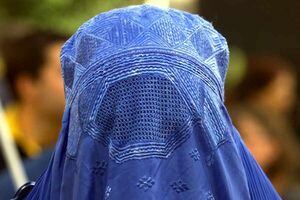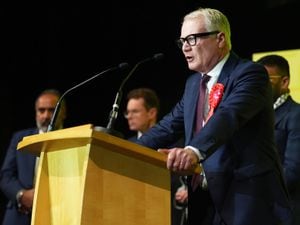COMMENT - The burkha: Should it be banned or not?
As the debate over the burkha continues to rage, Express & Star features writer Pete Cashmore and David Banner give their views on the subject.

Polls have shown that 57 per cent of the country's population would like to ban the burkha, and as we in the West Midlands are the proud heart of that country, why would we be different?
I am one of those who would fall in the minority however. I would not want to ban the burkha, and why would I?
I certainly wouldn't wear one – I'd swelter – but why would I want to deprive someone of the right to wear what they choose to wear?
I don't find burkhas offensive, but clearly many do or else they wouldn't want this ban. I just find myself wondering: Why?
Is it that the burkha could be seen as a symbol of oppression towards women, that says that women should be hidden, screened from the outside world, and subservient to attitudes that belong in medieval times? Do people find the burkha offensive out of a sense of revulsion at misogyny, subjugation and violence?
Perhaps they find the burkha an impediment to true equality, that they believe there are certain British everyday institutions, such as in banks, law courts, job interviews or other such official interactions, where it is wrong to be deprived of the ability to look the person facing you directly in the face.
You'd have to have some sympathy with that attitude, there are some British institutions that must be respected. Perhaps they feel like the burkha is a barrier to the full integration we surely crave in 2016. Or perhaps they just don't like it because Muslims wear it.
There's a strong chance that they, like the politicians of Nice, feel that wearing the trappings of hardline Islamism are, in the current climate, either grossly insensitive without knowing, or provocative knowingly.
It might well be that they just think that it's the wrong time for these rejections of Western values via one's outerwear.
Or they might just be rather scared of anybody they can identify as Muslim. But, for me, it's not women in burkhas and other such restrictive garb that come to my mind when I think of Islamist terrorism.
It's young men in Western casualwear and backpacks. It is, thanks to the ghastly recent atrocity in Nice, large trucks. It's AK47 assault rifles.
At least one of those we have banned, backpacks and lorries I'm pretty sure we never will.
The bottom line is that you can't just ban an item because of the very worst connotations that it carries to some observers.
The burkha itself has done nothing wrong. We could still, I suppose, ban it. After all, we wouldn't be the first nation to do so, at least in public.
In 2010 France banned the burkha in public. In 2011 Belgium followed suit.
The burkha isn't the problem, it's the ultra-hardline attitudes that enforce them, and those who wish to foist those attitudes upon us all.
A burkha ban just obscures the main question: How do we counter those?
In some quarters, anyone suggesting that the burkha should be banned is guilty of being a dirty, rotten racist and jumping on the same fear-led bandwagon favoured by populist politicians.
Yet opinion polls, for what they are worth, regularly tell us that the majority of British people are against full face veils.
Following hot on the heels of the EU referendum, here we have another issue where the majority of our Labour and Conservative politicians are out of sync with many of the people they represent.
The burkha debate is one that our politically correct power makers would rather not enter into, with the mere questioning of its place in British society giving rise to calls of Islamophobia and anti-freedom of expression.
Personally I see the debate surrounding burkhas – and their beachwear counterpart the burkini – as having nothing to do with religious prejudice and everything to do with the oppression of the wearer.
There is surely no greater affront to the concept of gender equality than the burkha.
Donning one marks the wearer as restricted property almost, setting women apart not only from men, but from the rest of society.
Far from being a symbol of Britain's integrated society, the burkha could be seen as a betrayal of modern British cultural values.
It causes divisions by making those who wear it appear disconnected and unapproachable.
Civil libertarians argue that people should be allowed to wear whatever they want, but the reality is that none of us have the right to dress however we like in public.
Our society, like every other developed society in the western world, dictates that personal freedoms must be weighted against social conventions.
If lines weren't drawn then people would be at liberty to walk around the streets naked or wander into the bank sporting a balaclava.
Either of those two scenarios would not be countenanced by most right-minded people, so why should we accept the burkha?
The idea that women's faces should be covered at all times is not a directive that comes from the Quran, yet as is often the case with religious scriptures, words have been interpreted to suit a particular agenda.
Worryingly, some (mainly western) women, appear to have taken to wearing the burkha as a statement of empowerment.
But for many women, the suspicion is that a burkha is not worn out of choice.
There is also a case for security, with cases of terrorists and criminals wearing the burkha as a means of evading detection.
We live in times of an unprecedented terrorist threat. It is more important than ever that people are visible in public.
In my view an outright ban may be a step too far. But is asking people not to wear burkhas in public places really too much to ask?





